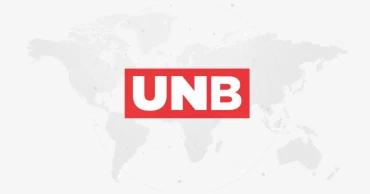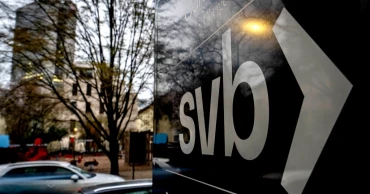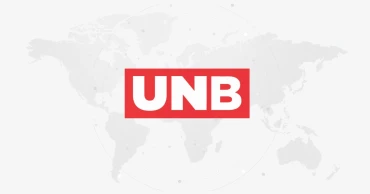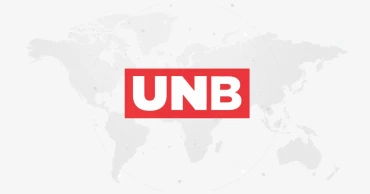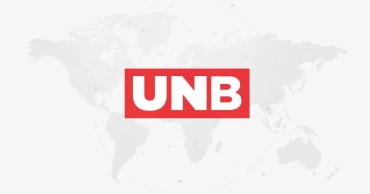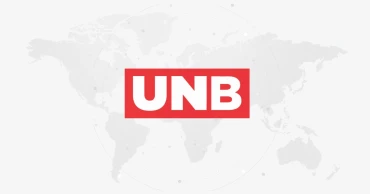HSBC
Bangladesh economy to rebound over coming year: HSBC
Chief Asia Economist and Co-Head of Global Research Asia, HSBC Frederic Neumann has said that even though Bangladesh’s GDP growth rate has been set to a revised 4.5% for FY2024-25, the country will rebound to 7.1% in the following year.
This growth will be largely driven by exports and remittances, both of which are showing positive signs despite the ongoing challenges in the global economy, he said in a webinar based on latest HSBC Global Research report on Bangladesh ‘Regaining balance - Bangladesh looks to recovery’.
The Hongkong and Shanghai Banking Corporation (HSBC) Limited in Bangladesh organised the economic outlook webinar titled ‘Navigating Bangladesh’s Crossroads’ highlighting the latest global and Asian market developments and sharing perspectives on Bangladesh.
Bangladesh received a $425mn remittance in 5 days of Oct: BB
Key speaker Neumann highlighted that the garment sector, which accounts for 83% of the country’s exports, is expected to grow by the demand from international markets.
At the same time, imports, which had been strained by rising global energy prices, are now stabilising reflecting a recovery in domestic demand and easing cost pressures.
He also mentioned that remittances are anticipated to grow driven by improved employment conditions in key overseas markets.
This rise in remittances will not only support household consumption but play a significant role in sustaining the broader economic recovery.
Neumann, however, noted that while these factors are promising, challenges remain, particularly with inflation.
This will continue to affect both household spending and business costs. Structural reforms in the banking sector and efforts to control inflation will be essential for unlocking Bangladesh’s full economic potential and ensuring long-term, sustainable growth.
Finance Adviser urges banks to ensure rigorous loan scrutiny and inclusive lending
During the webinar, he added, “Bangladesh is already well on its way to recovery. Macroeconomic adjustments undertaken in recent months, and robust economic fundamentals, should pave the way for growth to rebound over the coming year. A rapid implementation of reforms would help to speed up the process further.”
The event was also attended by Md Mahbub ur Rahman, Chief Executive Officer, HSBC Bangladesh and Gerard Haughey, Country Head of Wholesale Banking, HSBC Bangladesh.
Almost 300 clients and stakeholders were also in attendance at the virtual event.
1 year ago
HSBC recognised as 'Market Leader' in Bangladesh
Hongkong and Shanghai Banking Corporation (HSBC) has been voted "Market Leader' in Bangladesh in the Euromoney Trade Finance Survey 2023.
The survey also announced HSBC's global leadership in trade finance and top regional positions across Asia Pacific, Latin America, North America and the Middle East.
Euromoney Trade Finance Survey findings are based on a poll conducted among the businesses engaged in international trade, asking them to rank the top providers of trade finance.
Md Mahbub ur Rahman, chief executive officer of HSBC Bangladesh, said: "This Euromoney award is a testament to our customers' confidence in us and our ability to provide them with appropriate solutions. We aspire to continue to be the leading trade bank and meet the expectations of our customers for their evolving needs and connect them to a world of opportunities."
Gerard Haughey, country head of HSBC wholesale banking, said: "We are proud to be named market leader in trade finance. This achievement reflects our team's commitment to delivering exceptional services to our clients."
2 years ago
To avert a banking crisis, HSBC to take over UK arm of failed Silicon Valley Bank
Governments in the UK and U.S. took extraordinary steps to stop a potential banking crisis after the historic failure of Silicon Valley Bank, even as another major bank was shut down.
The UK Treasury and the Bank of England “facilitated the sale″ of Silicon Valley Bank UK to HSBC, ensuring the security of 6.7 billion pounds ($8.1 billion) of deposits.
British officials worked throughout the weekend to find a buyer for the UK subsidiary of the California-based bank, whose collapse was the second-largest bank failure in history.
“This morning, the government and the Bank of England facilitated a private sale of Silicon Valley Bank UK to HSBC,″ Treasury chief Jeremy Hunt said in a tweet. “Deposits will be protected, with no taxpayer support. I said yesterday that we would look after our tech sector, and we have worked urgently to deliver that promise.”
HSBC said it will acquire Silicon Valley Bank UK Ltd for one pound.
U.S. regulators also worked all weekend to try to find a buyer for the bank. Those efforts appeared to have failed Sunday. But U.S. officials assured all depositors at the failed institution that they could access all their money quickly,
The announcement came amid fears that the factors that caused the Santa Clara, California-based bank to fail could spread.
In a sign of how fast the financial bleeding was occurring, regulators announced that New York-based Signature Bank had also failed and was being seized on Sunday. At more than $110 billion in assets, Signature Bank is the third-largest bank failure in U.S. history.
The near-financial crisis that U.S. regulators had to intervene to prevent left Asian markets jittery as trading began Monday. Japan’s benchmark Nikkei 225 sank 1.6% in morning trading, Australia’s S&P/ASX 200 lost 0.3% and South Korea’s Kospi shed 0.4%. But Hong Kong’s Hang Seng rose 1.4% and the Shanghai Composite increased 0.3%.
In an effort to shore up confidence in the banking system, the Treasury Department, Federal Reserve and FDIC said Sunday that all Silicon Valley Bank clients would be protected and able to access their money. They also announced steps that are intended to protect the bank’s customers and prevent additional bank runs.
“This step will ensure that the U.S. banking system continues to perform its vital roles of protecting deposits and providing access to credit to households and businesses in a manner that promotes strong and sustainable economic growth,” the agencies said in a joint statement.
Under the plan, depositors at Silicon Valley Bank and Signature Bank, including those whose holdings exceed the $250,000 insurance limit, will be able to access their money on Monday.
Also Sunday, another beleaguered bank, First Republic Bank, announced that it had bolstered its financial health by gaining access to funding from the Fed and JPMorgan Chase.
In a separate announcement, the Fed late Sunday announced an expansive emergency lending program that’s intended to prevent a wave of bank runs that would threaten the stability of the banking system and the economy as a whole. Fed officials characterized the program as akin to what central banks have done for decades: Lend freely to the banking system so that customers would be confident that they could access their accounts whenever needed.
The lending facility will allow banks that need to raise cash to pay depositors to borrow that money from the Fed, rather than having to sell Treasuries and other securities to raise the money. Silicon Valley Bank had been forced to dump some of its Treasuries at at a loss to fund its customers’ withdrawals. Under the Fed’s new program, banks can post those securities as collateral and borrow from the emergency facility.
The Treasury has set aside $25 billion to offset any losses incurred under the Fed’s emergency lending facility. Fed officials said, however, that they do not expect to have to use any of that money, given that the securities posted as collateral have a very low risk of default.
Analysts said the Fed’s program should be enough to calm financial markets on Monday.
“Monday will surely be a stressful day for many in the regional banking sector, but today’s action dramatically reduces the risk of further contagion,” economists at Jefferies, an investment bank, said in a research note.
Though Sunday’s steps marked the most extensive government intervention in the banking system since the 2008 financial crisis, its actions are relatively limited compared with what was done 15 years ago.
The two failed banks themselves have not been rescued, and taxpayer money has not been provided to the banks.
President Joe Biden said Sunday evening as he boarded Air Force One back to Washington that he would speak about the bank situation on Monday. In a statement, Biden also said he was “firmly committed to holding those responsible for this mess fully accountable and to continuing our efforts to strengthen oversight and regulation of larger banks so that we are not in this position again.”
Regulators had to rush to close Silicon Valley Bank, a financial institution with more than $200 billion in assets, on Friday when it experienced a traditional run on the bank where depositors rushed to withdraw their funds all at once. It is the second-largest bank failure in U.S. history, behind only the 2008 failure of Washington Mutual.
Some prominent Silicon Valley executives feared that if Washington didn’t rescue the failed bank, customers would make runs on other financial institutions in the coming days. Stock prices plunged over the last few days at other banks that cater to technology companies, including First Republic Bank and PacWest Bank.
Among the bank’s customers are a range of companies from California’s wine industry, where many wineries rely on Silicon Valley Bank for loans, and technology startups devoted to combating climate change. Sunrun, which sells and leases solar energy systems, had less than $80 million of cash deposits with Silicon Valley. Stitchfix, the clothing retail website, disclosed recently that it had a credit line of up to $100 million with Silicon Valley Bank and other lenders.Tiffany Dufu, founder and CEO of The Cru, a New York-based career coaching platform and community for women, posted a video Sunday on LinkedIn from an airport bathroom, saying the bank crisis was testing her resiliency. Given that her money was tied up at Silicon Valley Bank, she had to pay her employees out of her personal bank account. With two teenagers to support who will be heading to college, she said she was relieved to hear that the government’s intent is to make depositors whole.
“Small businesses and early-stage startups don’t have a lot of access to leverage in a situation like this, and we’re often in a very vulnerable position, particularly when we have to fight so hard to get the wires into your bank account to begin with, particularly for me, as a Black female founder,” Dufu told The Associated Press.
Silicon Valley Bank began its slide into insolvency when its customers, largely technology companies that needed cash as they struggled to get financing, started withdrawing their deposits. The bank had to sell bonds at a loss to cover the withdrawals, leading to the largest failure of a U.S. financial institution since the height of the financial crisis.
Treasury Secretary Janet Yellen pointed to rising interest rates, which have been increased by the Federal Reserve to combat inflation, as the core problem for Silicon Valley Bank. Many of its assets, such as bonds or mortgage-backed securities, lost market value as rates climbed.
Sheila Bair, who was chairwoman of the FDIC during the 2008 financial crisis, recalled that with nearly all the bank failures then, “we sold a failed bank to a healthy bank. And usually, the healthy acquirer would also cover the uninsured because they wanted the franchise value of those large depositors so optimally, that’s the best outcome.”
But with Silicon Valley Bank, she told NBC’s “Meet the Press,” “this was a liquidity failure, it was a bank run, so they didn’t have time to prepare to market the bank. So they’re having to do that now, and playing catch-up.”
2 years ago
HSBC appoints Gerard Kevin Haughey as country head of Wholesale Banking in BD
Gerard Kevin Haughey has been appointed as the country head of Wholesale Banking, HSBC Bangladesh, effective from February 13 (Monday), subject to regulatory approvals.
Gerard brings almost 25 years of experience working in all business lines and multiple functions in HSBC, across Asia, Europe and North America, said a press release issued on Tuesday.
In his most recent role, he co-led the bank’s Global Trade and Receivables Finance (GTRF) business in the UK, providing a full range of working capital solutions to clients, supported by a team of 330 trade specialists.
As the country head of Wholesale Banking in Bangladesh, Gerard will be leading his team to support our customers’ evolving needs.
He will further develop HSBC’s franchise in the Bangladesh market which is increasingly vital to global trade and international supply chains.
Commenting on the appointment, Md Mahbub ur Rahman, Chief Executive Officer, HSBC Bangladesh said, “Bangladesh is one of Asia’s dynamic emerging economies. Gerard’s wealth of experience in diversified functions and continents will further complement our leadership position in Commercial Banking regionally and will build upon the momentum we have already created, serving our customers in Bangladesh even better.”
END/UNB/MAS
3 years ago
In the era of RMG, showcasing the Majestic Silks of Bangladesh
Highlighting the glorious and rich history of Bangladesh's fantabulous silk industry, eminent fashion designer Maheen Khan, in partnership with HSBC, organised an exclusive fashion show titled ‘Majestic Silks of Bangladesh’ at Gulshan Lake Park in the capital on Saturday.
In cooperation with Gulshan Society, the event showcased trendy fashionwear based on Bangladeshi silk, presented by 50 top models in the country.
The event was joined by cultural personalities and diplomats from various countries including Turkish Ambassador to Bangladesh Mustafa Osman Turan, Indonesian Ambassador to Bangladesh Heru Subolo, and more.
Read more: Bangladesh participates in Fashion World Tokyo
3 years ago
Bangladesh to become 9th largest consumer market globally by 2030: HSBC
With the fastest growing market, Bangladesh will become the 9th largest consumer market globally, overtaking Germany and the UK by 2030, HSBC Global Research report shows.
Bangladesh is expected to see the fastest growth in its consumer market in the current decade followed by India, the Philippines, Vietnam and Indonesia.
Korea and Japan will see a drop in the overall market by 2030, said the Hongkong and Shanghai Banking Corporation (HSBC) on Wednesday.
Read: HSBC supports students' int'l education journey
According to the report, Asia will become the dominant player in global consumer markets; Indonesia will overtake Brazil as the fourth-largest consumer market, after China, India, and the US.
In terms of size, mainland China is expected to retain its dominant position as being the biggest consumer market in the world with more than 800 million consumers by 2030 and 820 million by 2040.
Vietnam, Bangladesh and India are expected to see the biggest increase in consumer spending in the current decade.
Read HSBC introduces domestic foreign currency transaction through RTGS
The sectors, which reflect considerable growth in Bangladesh are – insurance, photographic and computer equipment, imputed rental and housing, package holidays and recreational items, vehicle purchase, financial services and other services.
As one of the world's largest banking and financial services organisations, HSBC combines unparalleled local insights, global connectivity and professional integrity to deliver the best investment opportunities to the clients and HSBC stakeholders through fundamental analysis and thought-provoking ideas. HSBC Global Research plays a key role in this regard.
According to HSBC Global Research ‘The Flying Dutchman’ report titled ‘Asia’s shoppers in 2030’ - over the next few decades, the world, and Asia in particular, will undergo significant demographic shifts.
Read Bangladesh: HSBC recognised as market leader in corporate Banking ESG CSR
As for Asia, the region will become considerably older, wealthier, and households will continue to get smaller. These changes result in significant shifts in spending patterns across Asia.
The proprietary demographic database of HSBC Global Research shows that Bangladesh’s consumer market will be bigger than the UK in 2030.
3 years ago
HSBC introduces domestic foreign currency transaction through RTGS
The Hongkong and Shanghai Banking Corporation (HSBC), along with Bangladesh Bank (BB), has initiated foreign currency (FCY) transaction solution through real-time gross settlement (RTGS) clearing of the central bank.
This solution will enable HSBC’s valued customers to make domestic foreign currency payments to other participating bank’s FCY accounts and to receive FCY payments from other participating bank’s FCY accounts, according to a media release issued today.
Additionally, under the trade umbrella, HSBC can now receive domestic export payments and execute domestic import payments besides receiving fund transfer via FCY RTGS from other bank margin accounts/ERQ account for import liability settlements.
Read BB lets dealers to open foreign currency deposit accounts
Earlier, domestic foreign currency settlement was executed through FCY demand draft (FDD), drawn on Bangladesh Bank, which required multiple days.
This previous process was time-consuming as the transaction details had to be checked and validated manually.
HSBC has been continuously introducing smooth and convenient digital services through its online platform, HSBCnet.
Through the establishment of domestic foreign currency settlement through RTGS, clients will be able to make their cash management payments online which remove their need to physically visit bank premises and handle paper-based instruments like FDD. As the FCY RTGS process is automated, the transaction will be faster, safer and more secured.
Read Cellfin launches Mastercard dual currency prepaid card
Payments will now be processed easily without any hassle and fund realisation for payee will be faster.
This will result in shorter processing time as transactions will be completed near real-time using RTGS instead of multiple days using FCY DD.
HSBC said it is determined to create opportunities for its clients to avail of smooth and convenient services.
Thus, with the introduction of new customised products like foreign currency transaction solutions via RTGS, HSBC is continuously making its customer journey easier.
Read Bangladesh Bank to flirt with digital currency en route to cashless society
3 years ago
Bangladesh: HSBC recognised as market leader in corporate banking, ESG, CSR
The Hongkong and Shanghai Banking Corporation Limited (HSBC) Bangladesh has recently been named as the market leader in highest number of (three) categories in Bangladesh for corporate banking, environmental, social and governance (ESG) and corporate social responsibility (CSR) in a survey done by Euromoney.
This survey is an independent assessment conducted by Euromoney, a leading global financial publication. It evaluates the work done by financial service providers across key banking categories and markets, HSBC Bangladesh said on Sunday.
HSBC Bangladesh said it is proud to be recognised in three different categories for the quality services that the bank has been providing during its long 25 years of service in Bangladesh.
The recognition is an acknowledgement of the strengths of HSBC Bangladesh driven by client-centric approaches all the way through its banking offerings, it said.
Md Mahbub ur Rahman, CEO of HSBC Bangladesh said, “Winning the ’Market Leader’ award and getting recognised by Euromoney inspired us more to serve our customers, society, and environment even better. Three recognitions in the same year- is a testament of the confidence our customers have bestowed on us as to our superior capability and service standards. We are humbled and committed to uphold our excellent performances in the days to come. “
Read: HSBC Bangladesh launches instant payments collection solution for customers
Kevin Green, Country Head of Wholesale Banking, HSBC Bangladesh said this is tremendous recognition for the services they are providing to their clients, the community and the environment.
“These prestigious awards were earned as a result of several notable industry-first transactions we have executed in the last year, reflecting our international footprint and expertise, digital propositions and thought leadership to support our clients in their transition to ’net zero‘. These awards will inspire us to continue the great work in the future,” Kevin Green said.
3 years ago
HSBC to support female entrepreneurs in Bangladesh
HSBC will launch the ‘Female Entrepreneur Fund (FEF)’ in Bangladesh on Thursday in acknowledgment of the challenges that female-owned businesses face.
Female Entrepreneur Fund (FEF) will be launched as part of HSBC’s global commitment to supporting female entrepreneurs.
The aim of the programme is to promote financial inclusivity for women entrepreneurs in Bangladesh through the FEF initiative by supporting: financial literacy, networking, and financing, said HSBC, one of the world’s largest banking and financial services organisations.
Read HSBC Bangladesh gets 1st female head of retail banking
Of HSBC’s clientele base - female led corporates, NGOs that help and promote female entrepreneurship, female led startups and some selected non-customer groups and individuals will be eligible to participate in the programme.
Participants will benefit from access to HSBC’s extensive local and global networks, opportunity to learn and share knowledge among a cohort of female entrepreneurs, workshops and master classes designed for specific needs.
Kevin Green, Country Head of Wholesale Banking, HSBC Bangladesh said finance has a pivotal role to play as a catalyst for change.
Read HSBC, IBA award young talents of Bangladesh with future skills
“Through programmes such as the Female Entrepreneur Fund, we are taking strides to bring financial independence and inclusivity to the communities that we operate in. This initiative will help us to connect our customers and communities with opportunities for growth”.
After a successful launch in 11 markets, Bangladesh joins a number of markets in Asia to the coverage of the programme.
3 years ago
HSBC Bangladesh gets 1st female head of retail banking
Tanmi Haque has been appointed Country Head of Retail Banking, HSBC Bangladesh effective from August 1.
Tanmi is a seasoned professional with more than 20 years’ experience across diverse functions of Banking and Development Sector including Strategy, Corporate & Retail Relationship Management, Financial Analysis, SME Advocacy, Process Effectiveness and Compliance.
Before joining HSBC, Tanmi was Head of Priority and Wealth, Standard Chartered Bank and has also worked for IFC under World Bank Group, said a media release on Sunday.
Also read: HSBC Bangladesh launches instant payments collection solution for customers
She started her career with American Express Bank, Dhaka as Management Trainee in 1998.
Tanmi succeeds Ahmed Saiful Islam who is moving to a new regional role in Hongkong within the bank.
Md. Mahbub ur Rahman, Chief Executive Officer, HSBC Bangladesh said: “It is exciting to see the female leadership taking up the responsibility of leading our market winning retail banking team. I am confident that Tanmi’s knowledge and experience will strongly enhance our retail banking operations, and contribute significantly to the success of the bank’s overall strategy.”
Also read: HSBC, IBA award young talents of Bangladesh with future skills
Tanmi completed her MBA from Monash University, Melbourne, Australia where she obtained a ‘High Distinction’ while specialising in Finance.
She had also completed MBA in Finance from The Institute of Business Administration, University of Dhaka, Bangladesh.
3 years ago

